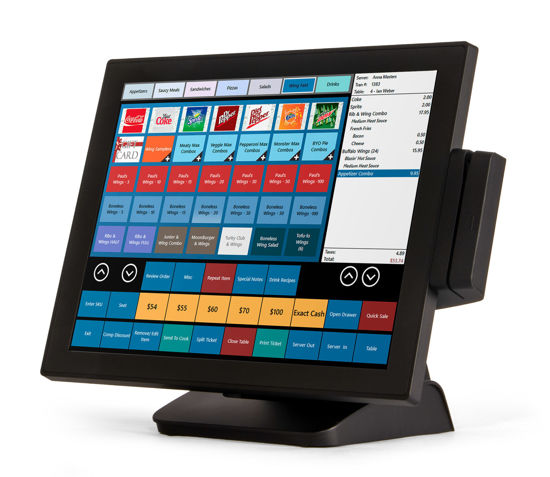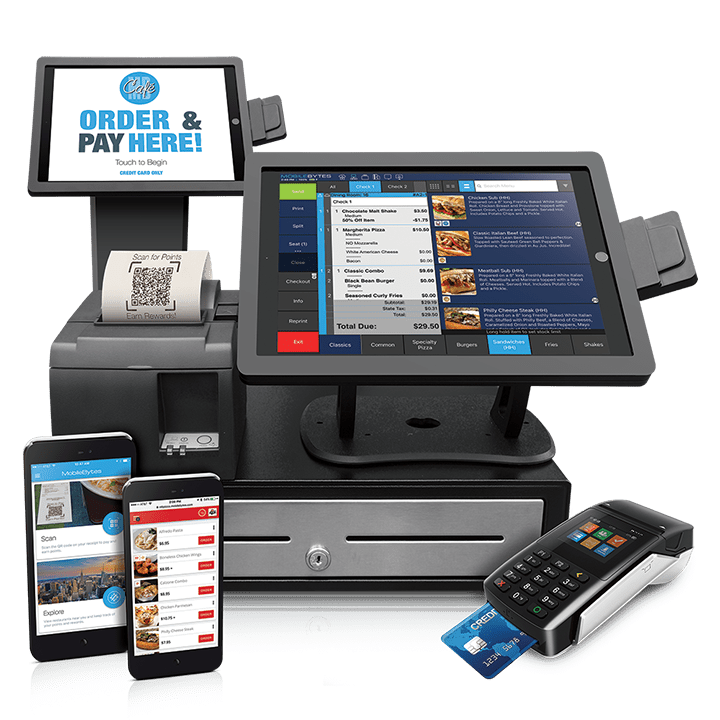Restaurant Pos Fundamentals Explained
Restaurant Pos Fundamentals Explained
Blog Article
7 Simple Techniques For Pos System For Small Business

POS Machine: Retail Point-Of-Sale Solutions Streamline Transactions
All About Restaurant Pos

Hardware Parts of a Point of Sale System What makes a POS system tick? It's not simply software application; the hardware plays a starring role. Believe of it as the body to the software's brain. Without the ideal hardware, even the most advanced POS software is simply a pretty face. Necessary POS Hardware So, what are the must-haves? Let's simplify. The main processing system, frequently a computer or tablet, is the heart of the operation. The display or touchscreen show permits staff to connect with the system. A barcode scanner speeds up the checkout procedure. Remember the days of by hand going into each code? The reliable invoice printer offers consumers with a record of their purchase. A money drawer keeps your money safe and organized. A card reader enables customers to pay with credit or debit cards. Diving Deeper: Beyond the Essential But wait, there's more! Depending on your company, you may need customized hardware. For instance, a dining establishment might incorporate cooking area printers to relay orders, while a retail shop might utilize label printers for item tagging. Ever question how your local bakery quickly prints those delicious-looking labels? Picking the Right Hardware: A Balancing Act Selecting the ideal hardware isn't just about buying the most pricey equipment. It has to do with finding the sweet area in between functionality, durability, and budget plan. A little service just beginning out may choose a more standard setup, while a high-volume retailer will need robust, high-performance devices. Is it better to purchase brand-new or utilized? Consider your options carefully. A brand-new system provides the newest innovation and warranty protection, but a reconditioned system can conserve you money. The Future of POS Hardware What does the future hold? Anticipate to see much more combination with mobile gadgets, biometric scanners for employee authentication, and advanced analytics control panels showed on larger, clearer screens. Envision a world where stock is immediately upgraded in real-time as items are scanned-- a world where check here you can track your very popular item from throughout the world. The possibilities are limitless, and the hardware is continually evolving to satisfy the needs these days's companies. Are you ready to update your point of sale system?
Software Features and Capabilities: The Heart of Your POS System
Ever see a skilled barista slide through a hectic morning rush? Their trick isn't just caffeine; it's a seamless dance with their POS system. The software is the conductor of your service symphony, managing everything from sales to inventory. However what notes should you be listening for? What capabilities truly matter in today's market?
Inventory Management: Beyond Counting Beans
Forget spreadsheets that haunt your dreams. Modern POS systems use real-time stock tracking, informing you when your stock of artisanal coffee beans dips precariously low. Consider it as a digital guardian angel, avoiding those uncomfortable "Sorry, we're out!" minutes to clients. What if you could also predict demand based upon historic information? Numerous systems now provide forecasting tools, a powerful weapon against overstocking and lost sales. This helps avoid the predicament of lacking popular products or accumulating excess stock of slow-moving items, both of which can constrain money circulation and space.
Sales Reporting and Analytics: Decoding the Information
Sales information is the brand-new gold, and your POS system is the miner. Forget just understanding how much you sold today. Dive deep into the information to uncover patterns, recognize your very popular items, and comprehend customer behavior. Which menu product sets perfectly with the day-to-day special? Which promotion resonated most with your clients? These insights are not just fascinating; they're actionable intelligence. Without reputable sales reporting, browsing the complexities of company decision-making becomes like sailing without a compass, increasing the possibility of errors and missed out on chances.
Customer Relationship Management (CRM): Structure Bridges, Not Walls
Remembering a routine client's name and preferred order is charming, however scaling that individual touch is tricky. POS systems with CRM capabilities enable you to track consumer purchase history, choices, and even birthdays. Picture automatically offering a discount rate on their birthday-- a small gesture that promotes loyalty and encourages repeat organization. There is the prospective snag of poor information quality, which can lead to unreliable customer profiles and inadequate marketing efforts.
Payment Processing: Simplifying the Deal
The checkout experience can make or break a sale. Smooth integration with various payment methods-- charge card, mobile wallets, even copyright-- is non-negotiable. Can your system manage split payments? Does it use safe tokenization to protect client information? A clunky payment procedure is like hitting a sour note in your company symphony, possibly interfering with the whole performance. Making sure compatibility with evolving payment technologies and adherence to security requirements are paramount for keeping customer trust and operational effectiveness.
Employee Management: Keeping the Team in Sync
From clocking in and out to handling approvals and tracking efficiency, employee management includes streamline operations and enhance responsibility. Is scheduling a problem? Many POS systems use integrated scheduling tools, optimizing staffing levels based upon anticipated demand. A common challenge that is frequently overlooked is the challenge of integrating employee management functionalities with payroll systems, which can cause mistakes and inadequacies in wage calculations.
Advanced Features: Leveling Up Your Operations
- Table Management: Ideal for dining establishments, this function enables you to envision your dining space, track table status, and handle bookings.
- Commitment Programs: Reward your finest clients and motivate repeat service with integrated loyalty programs.
- Online Purchasing Combination: Perfectly incorporate your POS system with online purchasing platforms to expand your reach.
Picking the ideal POS system is about more than simply performance; it has to do with discovering a partner that can grow with your organization. Consider your existing requirements, prepare for future development, and do not be scared to ask the difficult concerns. The right software can change your service from a disorderly cacophony into an unified work of art.
Industry-Specific POS System Applications
Think about the local bakeshop, bustling with morning clients craving fresh croissants. A generic POS system might deal with deals, however can it handle complex recipes, track ingredient stock, or automatically change production schedules based upon sales information? Probably not. That is where the appeal of industry-specific POS systems shines.
Dining establishments and Hospitality
For dynamic restaurants, speed and accuracy are critical. How numerous times have you seen servers handling orders, modifications, and splitting expenses, all while trying to supply excellent service? A dining establishment POS system simplifies these procedures, enabling table management, cooking area order tickets, and even online buying combination. These systems typically include functions like ingredient-level stock tracking, crucial for handling food expenses and minimizing waste. Ever question why your preferred meal is sometimes unavailable? It might originate from an absence of appropriate stock management.
- Table Management
- Kitchen Area Order Tickets
- Online Buying Integration
- Ingredient-Level Stock Tracking
Retail Solutions
Retail, with its diverse inventory and client interactions, requires a different set of tools. Imagine a shop clothing store having a hard time to monitor sizes, colors, and seasonal collections utilizing a basic checkout system. An industry-specific retail POS system provides functions like barcode scanning, client loyalty programs, and in-depth sales reporting. These systems can even incorporate with e-commerce platforms, supplying a seamless omnichannel experience for customers. Did you understand some retail POS systems can predict future sales trends based upon historic data? Now that is powerful!
The Dangers of a Mismatch
Choosing the wrong POS system can produce significant operational obstacles. A clothes boutique utilizing a dining establishment POS, for instance, would find it inappropriate for managing stock with sizes and colors. The absence of proper reporting and analytics could cause misinformed getting decisions and lost income. The result could be comparable to trying to fit a square peg in a round hole.
Secret Considerations
Picking an industry-specific POS system needs mindful evaluation. Believe about your business's special needs and functional workflows. Does the system incorporate with existing software application? Does it offer the required reporting abilities? Is it scalable to accommodate future development? A well-chosen POS system is not just a transaction tool; it's a strategic possession that can drive performance, enhance customer fulfillment, and eventually, improve your bottom line. Keep in mind, it is a financial investment in your company's future, not simply an expense.
Security Considerations for Point of Sale Systems
Ever heard the tale of the mom-and-pop shop that lost whatever because of a single, overlooked security defect in their POS system!.?. !? It's a cautionary tale, and it highlights a crucial aspect typically overshadowed by the appeal of elegant functions and streamlined operations. The truth is, a POS system is just as excellent as its security. What great is a system that crunches numbers in a flash if it enables crooks to swipe consumer's information simply as rapidly?
The Vulnerability Minefield
The digital landscape is a battlefield. Every POS system, no matter size or elegance, is a possible target. Are you really prepared for the risks lurking around the corner? The real pinch comes when you discover that your outdated software has an open hole that hackers can make use of, turning your company into an unwitting accomplice in identity theft. The problem is that hackers are crafty and are always changing their methods.
Typical Security Gaps and Specialist Tips
- Weak Passwords: "Password123" isn't sufficing. Use strong, special passwords for all POS system accounts and change them routinely. Two-factor authentication is a must.
- Unsecured Networks: Your Wi-Fi resembles leaving the front door open. Secure your network with strong encryption (WPA3 if possible) and consider a separate network for your POS system.
- Outdated Software Application: Software application suppliers patch security holes all the time. Failing to upgrade resembles inviting problem. Set up automatic updates or schedule routine maintenance.
- Staff member Training: Your staff is your very first line of defense. Train them to acknowledge phishing attempts, secure passwords, and report suspicious activity.
Information File Encryption: Your Shield Against the Dark Arts
Think about data encryption as a secret code. It scrambles sensitive info, like credit card numbers, making it unreadable to unauthorized users. Without file encryption, your clients' monetary details resemble sitting ducks, ripe for the selecting by cybercriminals. It's not practically securing your consumers; it's about safeguarding your credibility and avoiding substantial fines.
PCI Compliance: The Rulebook You Can't Neglect
If you accept credit cards, you're bound by the Payment Card Industry Data Security Standard (PCI DSS) It's a set of security standards designed to protect cardholder information. Stopping working to comply can lead to fines, penalties, and even the loss of your ability to process credit card payments. It's a headache, yes, but it's a necessary one. Consider PCI compliance as the cost of doing service in the digital age.
Consider this: every transaction processed through your point of sale is a prospective entry point for malicious actors. By carrying out robust security steps, you're not simply protecting your business; you're protecting your customers' trust and making sure the long-term viability of your operations. The security of your POS system isn't just a technical concern; it's a service imperative. It requires constant alertness, proactive steps, and a dedication to remaining ahead of the curve.